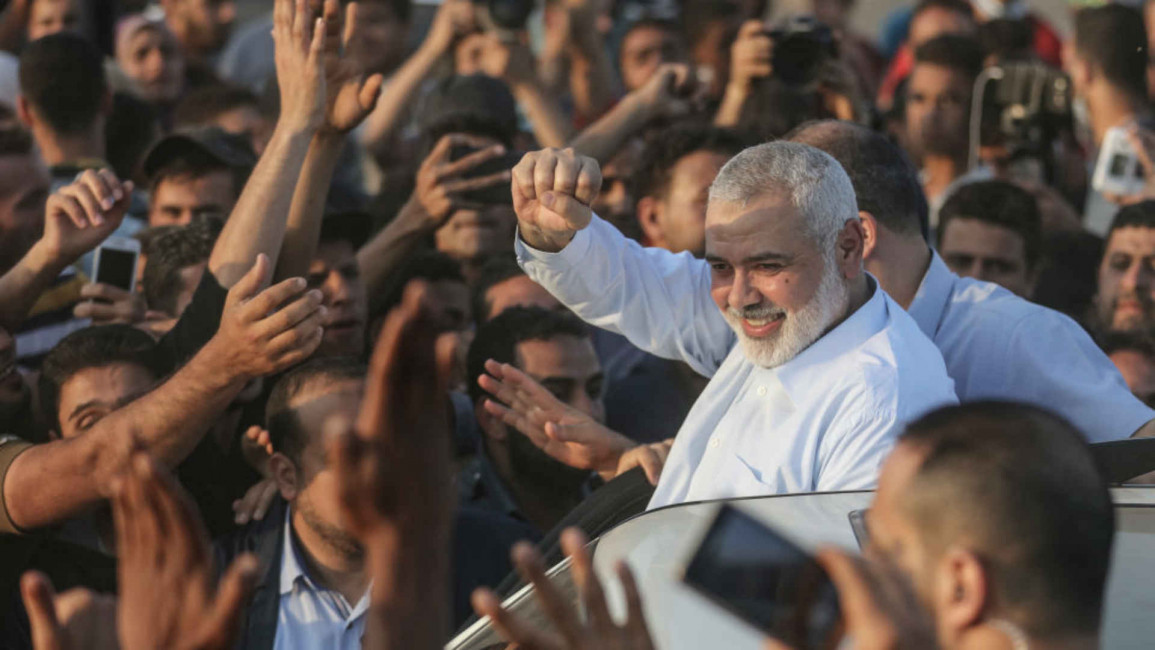
Hamas forced to adapt as Arab solidarity fades
The charter was overwhelmingly punctuated by Quranic and Fiqhic formulations, echoing prevailing rhetoric in the region. It emphasised Hamas' Islamist dimension and considered Palestine "a land of Islamic Waqf (endowment)" which "belongs to every Muslim".
Drawing inspiration from the US Saudi-backed guerrilla war of insurgent "mujahideen" groups against the Soviets, Hamas deemed itself an extension of this current, and defined the conflict as "a component in the body of jihad".
The charter pressed Palestinian liberation on "every Muslim". It didn't not regard Hamas as a "liberation movement"; rather defined it as a "Mujahedeen" movement. It demonstrated a broad understanding of jihad - not limited to military actions - instead raising awareness, investing in education, women's engagement, Islamic art and solidarity were all parts of "jihad".
Thus, Hamas' mission was steadfastness and raising a religiously-aware generation until external liberation. As a Hamas leader once put it, "Arab leaders were rhetorically competing on who's going to liberate Palestine first. We thought Saddam Hussein was the next Salah al-Din Ayyub when he pledged to liberate Palestine and bombed Tel Aviv."
However, not only liberation from the outside never happen, but also moral and physical support for Palestine also began to fade significantly over the years. As Professor Walid Khalidi theorised in 1978, after each loss suffered by the Palestinian resistance movement, the "Palestinian component of the Arab-Israeli conflict [would] somehow disappear from the Middle Eastern scene".
After Hamas' 2006 election victory, the movement's leaders were in for an unexpected shock.
Twitter Post
|
Hamas didn't get the support of Muslim and Arab states that it had expected, and its first government was pressured by Arab states to accept the 2003 Arab Peace Initiative, and was even widely boycotted until it recognised Israel.
During a whole decade of isolation and repeated assaults on Gaza, Hamas desperately sought to attract Arab and Muslim states' support for Gaza, but failed. The organisation gradually realised the need for Palestinians to claim their own struggle.
In 2017, Hamas redefined itself with a new charter that became the basis on which it openly reconciled with Egypt, and is currently involved in indirect negotiations with Israel. The most intrinsic changes to Hamas' ideology and consequently its political conduct, are as follows.
A national, Palestinian struggle
The new charter exclusively redefined Hamas as a "Palestinian Islamic national liberation and resistance movement" prioritising the national and liberation dimensions over its Islamic spirit. It deemed that liberating Palestine "is the duty of the Palestinian people," and dropped the old designation of Palestine as a land of "waqf" (endowment).
In his book, 'The political thought of the Islamic resistance movement Hamas', leader Khaled Meshaal wrote that Palestinians should take a leading role in the battle for liberation, and that this "should not be considered an annex to the Arab and Islamic roles".
The 2017 charter defined the distinctive Palestinian identity and emphasised Palestinian unity, "regardless of religion, culture or political affiliations." The new charter also defined Palestine's sovereign borders and used the phrase "the Arab Palestinian people," instead of the old charter's phrase, "the Arab people in Palestine."
Reconciling with the world, non-interference and denouncing anti-Semitism
The 1988 charter was characterised by ambition and naivety. It designated Hamas a supporter of the oppressed worldwide, whereas the new charter retracted from such a broad and controversial goal, and emphasised that Hamas respects the people's will and refuses to interfere in the internal affairs of other states and their inter-state conflicts.
It sufficed with condemning "all forms of colonialism, occupation, discrimination, injustice and aggression in the world."
Read more: Hamas charts a new, more tolerant course
The 2017 charter stressed "the necessity of maintaining the independence of Palestinian national decision-making," without external interventions.
The 2017 charter dropped Hamas' problematic association and connection to the widely persecuted Muslim Brotherhood. And to avoid being lumped in with internationally designated terrorist organisations such as al-Qaeda and Islamic State group, the new charter also dropped the old goal of "re-establishing the state of Islam". Instead it emphasised Hamas' belief in coexistence.
The new charter makes fewer references to "Jews", and instead points to 'occupiers' at the root of the conflict, drawing political, rather than religious differences. It also acknowledges that Jewish suffering, "anti-Semitism and persecution of Jews are phenomena fundamentally linked to European history".
 |
The 1988 charter was characterised by ambition and naivety |  |
As Khaled Meshaal asserts in his book, "The resistance and military confrontation with the Israelis are caused by the occupation, the aggression and the crimes they commit against [us]," and not because "they are Jews".
Joining a national consensus
Hamas' 1988 charter loathed the PLO's secularism, stating that "[Hamas] cannot replace the present and future Islamism of Palestine to adopt secular ideology." When the PLO signed the Oslo accords, Hamas labeled it as "treachery" equal to the Balfour Declaration. The 1988 Charter, written by first generation refugees, strictly refused all political compromises as "a relinquishment of the religion itself".
However, the 2017 charter, written by second generation refugees, shows official readiness to accept a sovereign Palestinian state on the 1967 borders, if it enjoys national consensus. It deemed the PLO "a national framework for the Palestinian people... Which must be preserved, with the need to work on developing and rebuilding it on democratic foundations."
Sticking points
The new charter's state formula rejects recognising Israel; a dilemma Hamas has yet to transcend with the existing status quo. In that sense, most Hamas leaders consider the establishment of a Palestinian state, or at an improvement in Palestinian living conditions through a ceasefire, to be a stepping stone towards peace.
The new charter left many questions open, but Hamas intellectuals perceive those questions to be the door to eventually dealing directly with Israel and recognising its de facto existence.
The issue of contiguity, for example, deals with how Palestinians would travel between Gaza and the West Bank without passing through Israel. Establishing formal relations to govern such a mechanism is an inescapable yet significant reason to recognise Israel.
 |
The 2017 charter, written by second generation refugees, shows official readiness to accept a sovereign Palestinian state on the 1967 borders |  |
The other dilemma facing Hamas is its desire to shift its conduct and tactics to more internationally accepted forms, such as non-violent resistance. But the new charter unfortunately placed armed resistance at the heart of Hamas' conduct and strategies, illustrating how it has become a in goal itself, rather than a temporary means to liberation.
By praising armed resistance, Hamas believes it maintains superior moral ground over its political opponents. For them, giving up the rhetoric of armed resistance before reaching genuine peace would largely equate Hamas with the "collaborationist and corrupt" PA.
Overall, the new charter, resulting from their realisation of an ever-increasing lack of Arab solidarity, reshapes Hamas' political conduct towards its survival.
However, the only fruit their rebranding exercise seems to have borne, is that Hamas leaders in exile can now freely visit Egypt, and even its most wanted leaders - such as Saleh Arouri - can visit Gaza without fear of Israeli assassination.
But while these rhetorical positions are being reworked, Gaza's misery continues unabated, demonstrating that Israel's problem is no longer with Hamas as such, but rather with Gaza's existence, where Israel tries desperately to throw the responsibility of Gaza's welfare into Egypt's lap, while maintaining control over its population.
Muhammad Shehada is a writer and civil society activist from the Gaza Strip and a student of Development Studies at Lund University, Sweden. He was the PR officer for the Gaza office of the Euro-Med Monitor for Human Rights.
Follow us on Twitter: @The_NewArab




